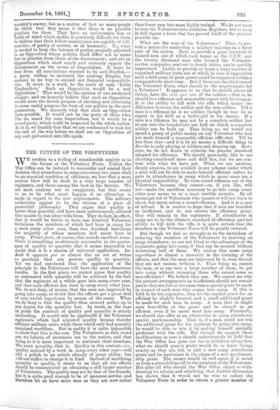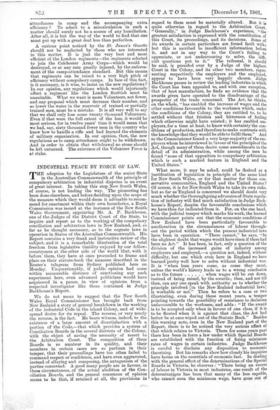THE INURE OF .1.11/4 VOLUNTEERS.
wE confess to a feeling of considerable anxiety as to the future of the Volunteer Force. Unless the War Office can be induced to reconsider and amend their decision that attendance in camp once every two years shall be an essential condition of efficiency, we fear that a most serious blow will be dealt to a very large number of regiments, and those among the best in the Service. We • are most anxious not to exaggerate, but that seems to us to be what must happen if no alteration is made in regard to the new requirements. The military authorities appear to be the victims of a piece of proverbial philosophy. They argue that quality is better than quantity, and have most unfortunately allowed this maxim to run away with them. They declare, in effect, that it would be better to have one hundred Volunteer battalions the members of which had been in camp for a week every other year, than two hundred battalions the majority of whose members had never been in camp. Primal facie, of course, this sounds excellent sense. There is something so obviously reasonable in the prefer- ence of quality to quantity that it seems impossible to doubt that it is a maxim of universal application. In- deed it appears per se almost like an act of virtue to proclaim that one prefers qiiality to quantity. Yet we feel convinced that the application of the principle to the Volunteers will have the most disastrous results. In the first place, we cannot agree that quality as contrasted with quantity will be achieved by the fact that the regiment as a whole goes into camp every year, and that each efficient has been in camp every other year. We do not deny, of course, that the men are improved by going into camp, or doubt that the officers get a great deal of very useful experience by means of the camp. What we do deny is that the quality thus secured makes up in any degree for the quantity lost. In truth, in the case in point the contrast of quality and quantity is utterly misleading. It would only be applicable if the Volunteer regiments which had acquired quality became thereby efficient military units, while those which only had quantity remained worthless. But in reality it is quite impossible to show that this is the case. The Volunteers as they stand are, we believe, of enormous use to the nation, and that being so it is most important to maintain their numbers. We want quantity, that is. Quality in this context—i.e., quality secured by a week in camp every other year—will add a polish to an article already of great utility, but will not suffice to change it in kind. Instead of sacrificing quantity to quality, it seems to us that all our efforts should be concentrated on obtaining a still larger number of Volunteers. The quality may not be that of the Guards, but it is quite good enough to be of immense service, and. therefore let us have more men as they are now rather than fewer men but more highly trained. We do not want to turn the Volunteers into imitation Regulars, but to keep in full vigour a force that has proved itself of the greatest possible use.
What are the uses of the Volunteers ? First, to pro vide a means for conferring a military training on a large part of the nation. Next, to provide a great reservoir of trained men out of which such forces as the C.I.V. and the twenty thousand men who formed the Volunteet service companies sent out to South Africa can be quickly improvised. Lastly, to provide at home a large number of organised military units out of which in case of imperative need a field army of great power could be organised within a comparatively short time. But if these are the chief uses of the Volunteer Force, what should be the requirements for a Volunteer ? It appears to us that he should, above all things, have the sine qud non of the soldier,—that is, he should be a rifleman and reasonably expert with his weapon. It is the ability to kill with the rifle which makes the difference between the soldier and the non-soldier. Till a man is a rifleman he is no soldier, though he may be as expert in his drill as a ballet-girl in her dances. If a man is a rifleman he may not be a complete soldier, but at any rate the foundations are laid on which a complete soldier can be built up. That being so, we would not spend a penny of public money on any Volunteer who had not made himself a reasonably efficient rifle-shot. Till he has done that—and it is by no means a difficult thing to do—he is only playing at soldiers and dressing up. How- ever, we do not desire to criticise the present standard adopted for efficiency. We should, personally, like to see shooting considered more and drill less, but we are con- tent with what we have got. What we are anxious, deeply anxious, to see avoided is any scheme under which a man will not be able to make himself efficient unless he puts in attendances in camp which in many cases are a physical impossibility. To turn sound riflemen out of the Volunteers because they cannot—or, if you like, will not—make the sacrifices necessary to go into camp every other year seems to us a most terrible mistake. By all means get rid of Volunteers who cannot or will not learn to shoot, but never refuse a sound rifleman. And it is a case of refusal. It is useless to hope that if men are branded as inefficient, and do not receive the efficiency grant, they will remain in the regiments. If attendances in camp are to be the ultimate standard of efficiency, and not ability to kill with the rifle, it is quite certain that the numbers in the Volunteer Force will be greatly reduced.
But though we feel so strongly as to the unwisdom of reducing the numbers of the Volunteers by insisting on camp attendance, we are not blind to the advantage of the regiments going into camp if that can be secured without destroying half of them. We realise that some camp experience is almost a necessity in the training of the officers, and that the men are improved by it, even though they are not useless without it. That being so, cannot the men, or at any rate a large number of them, be got into camp without stamping those who cannot come as non-efficients ? We believe they can. We cannot see why the present arrangements as to efficients should not remain just as they are, but at the same time a special grant be made in respect of each man who comes into camp. If this is held to be too expensive, then let the regular grant for an efficient be slightly lowered, and a small additional grant be made for each man in camp. A man, that is, might earn four-fifths of the grant and be classed as an efficient even if he never went into camp. Personally, we should also offer as an alternative to camp attendance special marksmanship. That is, if a man could not win the additional grant for his regiment by going into camp, he would be able to win it by making himself specially proficient with the rifle. But though we suggest these modifications in case it should unfortunately be held that the War Office has gone too far to withdraw altogether, what we should greatly prefer would be to leave things exactly as they are, but to add a new camp attendance grant and its equivalent in the shape of a new marksman- ship grant. The money would be well spent if it saved us from a. great falling-off in the numbers of the Volunteers. But after all why should the War Office object to with- drawing its scheme and admitting that further discussion has shown that it would not be wise to reduce the Volunteer Force in order to obtain a greater number of attendances in camp and the accompanying extra efficiency ? To admit to a miscalculation in such a matter should surely not be a source of any humiliation. After all, it is but the way of the world • to find that one must put up with a great deal less than perfection.
A curious point noticed by the St. James's Gazette should not be neglected by those who are interested in " this matter. It is just the very best and most efficient of the London regiments—the regiments selected to join the Colchester Army Corps—which would be destroyed, or at any rate greatly injured, by the enforce- ment of the camp-attendance standard. But this means that regiments can be raised to a very high pitch of efficiency without compulsory camps. In face of this fact, is it necessary, is it wise, to insist on the new regulations ? In our opinion, any regulations which would injuriously affect a regiment like the London Scottish must be unsuitable. What we want is more Volunteers, not fewer, and any proposal which must decrease their number, and so lower the water in the reservoir of trained or partially trained men, must be a mistake. It is all very well to say that we shall only lose some twenty thousand Volunteers. Even if that were the full extent Of the loss, it would be most serious, for in twelve years' time it would mean that we had, say, sixty thousand fewer men in the country who knew how to handle a rifle and had learned the elements of military organisation. In our opinion, then, the new regulations as to camp attendance ought to be withdrawn. And in order to obtain that withdrawal no stone should be left unturned. The existence of the Volunteer Force is at stake.















































 Previous page
Previous page